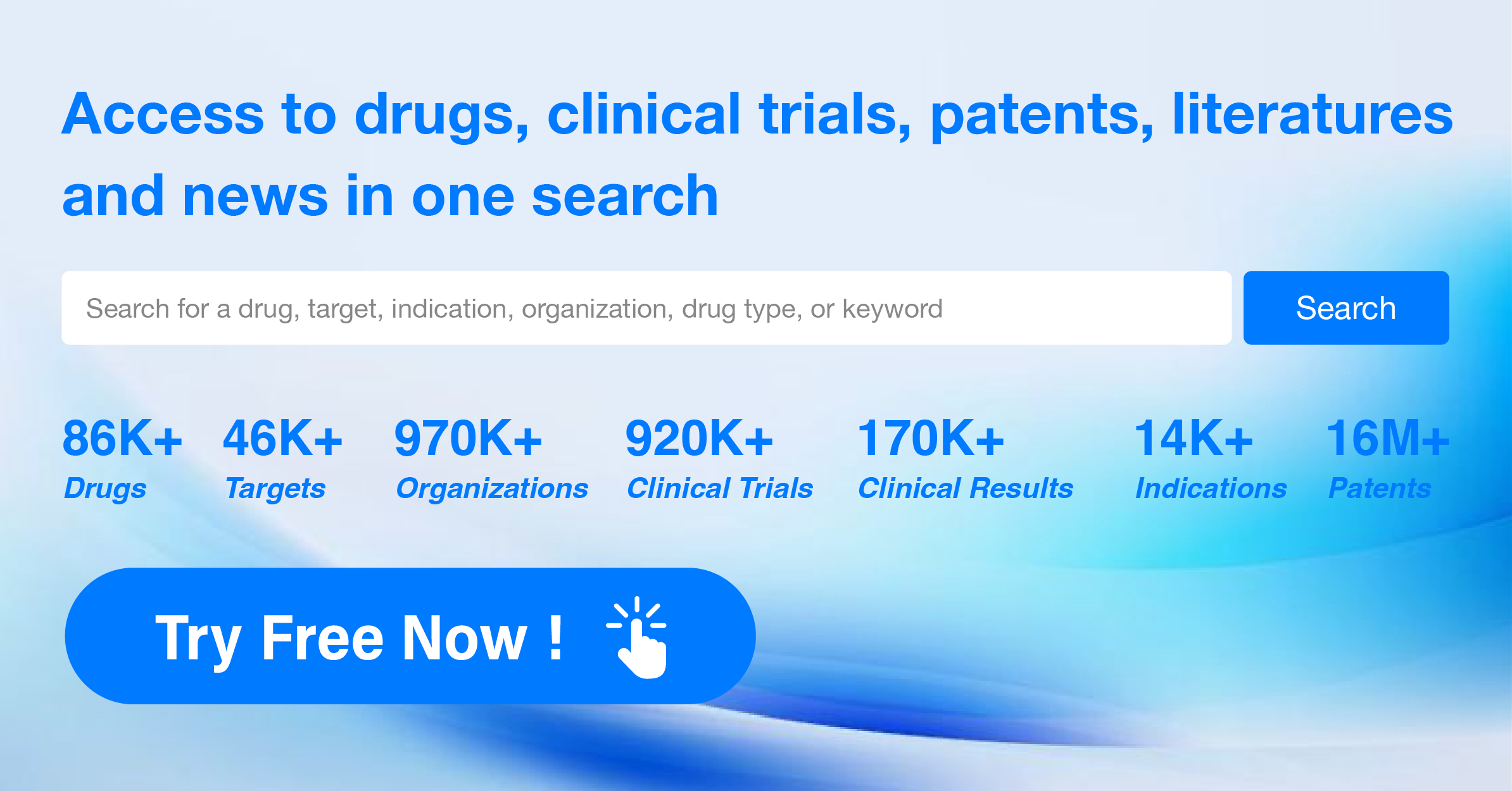Pharma Frontiers: Daily Digest of Global Pharmaceutical News - Jun 5
1.InnoCare Pharma's Anti-CD19 Monoclonal Antibody Tafasitamab to be Considered for Priority Review for Treating Hematological Cancers
On June 4, the latest announcement on the official website of the Center for Drug Evaluation (CDE) of the China National Medical Products Administration (NMPA) revealed that InnoCare Pharma's application for injectable tafasitamab is to be considered for priority review. The indication is for the combination with lenalidomide for the treatment of adult patients with relapsed or refractory diffuse large B-cell lymphoma (DLBCL) who are ineligible for autologous stem cell transplant (ASCT). Tafasitamab is a humanized monoclonal antibody targeting CD19 with an optimized Fc domain. DLBCL is the most common subtype of non-Hodgkin lymphoma (NHL), accounting for 31% to 34% of NHL cases worldwide. According to the Chinese Society of Hematology, DLBCL accounts for 45.8% of all NHL cases in China.
According to information published by InnoCare Pharma, tafasitamab is a humanized monoclonal antibody targeting CD19 with an optimized Fc domain. The unique engineered Fc domain of tafasitamab significantly enhances antibody-dependent cellular cytotoxicity (ADCC) and antibody-dependent cellular phagocytosis (ADCP), mediating the lysis of B-cell tumors through apoptosis and immune effector mechanisms. In August 2021, InnoCare Pharma and Incyte entered into a collaboration and licensing agreement for the development and exclusive commercialization of tafasitamab for hematologic and solid tumors in Greater China. Tafasitamab has previously been approved by the U.S. FDA and the European Medicines Agency (EMA) for use in combination with lenalidomide for treating relapsed/refractory DLBCL patients ineligible for autologous stem cell transplantation. Tafasitamab treatment has also been approved for marketing in the Hong Kong region for DLBCL patients.
2.Johnson & Johnson's Bispecific Antibody Rybrevant Shows Positive Phase 3 Results in First-Line Combination Therapy
On June 4, Johnson & Johnson Innovative Medicine announced new data from the Phase 3 MARIPOSA study. The analysis revealed that their bispecific antibody Rybrevant (amivantamab), in combination with the third-generation epidermal growth factor receptor (EGFR) tyrosine kinase inhibitor (TKI) oral drug lazertinib, significantly improves progression-free survival (PFS) in subgroups of high-risk adult patients with locally advanced or metastatic non-small cell lung cancer (NSCLC) harboring EGFR exon 19 deletion (ex19del) or L858R substitution mutations compared to the active comparator.
Specifically, the combination of amivantamab and lazertinib demonstrated a significant reduction in the risk of disease progression or death in all high-risk subgroups when compared to the active comparator TKI drug Tagrisso (osimertinib). For patients with a history of brain metastases, PFS was 18.3 months with the amivantamab combination therapy versus 13.0 months for the active comparator group, representing a 31% reduction in the risk of disease progression or death (HR=0.69, 95% CI: 0.53-0.92; P=0.010). In patients with baseline liver metastases, PFS was 18.2 months for the amivantamab combination therapy compared to 11.0 months for the active comparator group, resulting in a 42% reduction in the risk of disease progression or death (HR=0.58, 95% CI: 0.37-0.91; P=0.017).
Amivantamab is a humanized EGFR/MET bispecific antibody. It employs multiple mechanisms of action to fight cancer, not only by blocking EGFR and MET-mediated signaling but also by directing immune cells to target tumors carrying activating and resistant EGFR/MET mutations and amplifications. Amivantamab received accelerated approval from the U.S. FDA in May 2021 for the treatment of adult patients with locally advanced or metastatic NSCLC with EGFR exon 20 insertion mutations whose disease has progressed on or after platinum-based chemotherapy.
3.Arrowhead's Investigational Long-Acting Therapy Plozasiran Achieves Primary Endpoint in Phase 3 Clinical Trial
June 4, Arrowhead Pharmaceuticals announced topline results from the pivotal Phase 3 clinical trial PALISADE, evaluating its investigational therapy plozasiran in patients diagnosed with familial chylomicronemia syndrome (FCS). The data indicated that plozasiran successfully met the primary endpoint of triglyceride reduction, with up to a 99% decrease observed at month 12. Plozasiran also achieved all key secondary endpoints, including a reduction in the incidence of acute pancreatitis compared to placebo. The primary endpoint of the PALISADE study was the median percentage change in triglyceride levels from baseline to month 10, adjusted for placebo. At this time point, patients receiving quarterly doses of 25 mg or 50 mg of plozasiran achieved a median triglyceride reduction of 80% and 78%, respectively, with maximum reductions reaching up to 98%. At month 12, patients on 25 mg or 50 mg of plozasiran achieved a median triglyceride reduction of 78% and 73%, respectively, with maximal reductions reaching up to 99%. In contrast, patients receiving placebo showed median triglyceride level reductions of 17% and 7% at months 10 and 12, respectively. At month 10, patients in the 25 mg and 50 mg plozasiran groups had average reductions in apolipoprotein C-III (APOC3) levels of 88% and 94%, respectively.
In addition to the primary endpoint, plozasiran met all key secondary endpoints, which included the percentage change in fasting triglycerides from baseline at months 10 and 12 (averaged), percentage change in fasting APOC3 from baseline at month 10, and the percentage change in fasting APOC3 from baseline at month 12. Moreover, the incidence of acute pancreatitis events during the randomized controlled study period was assessed. Plozasiran demonstrated a favorable safety profile in the PALISADE study, with the number of participants reporting adverse events (AEs) being similar between the plozasiran and placebo groups. The most common AEs included abdominal pain, COVID-19, nasopharyngitis, headache, and nausea.
4.Agios' Oral Therapy for Thalassemia, Mitapivat, Meets Primary Endpoint in Phase III Study
On June 3, Agios announced that its Phase III ENERGIZE-T study of mitapivat in adult patients with transfusion-dependent (TD) α- or β-thalassemia met its primary endpoint, significantly reducing the need for transfusions. Mitapivat is a first-in-class, oral pyruvate kinase-R (PKR) activator that activates both wild-type and mutant PKR, improving the energy supply and health of red blood cells. In February 2022, mitapivat received its first FDA approval for treating adult hemolytic anemia caused by pyruvate kinase (PK) deficiency, making it the first disease-modifying therapy for this condition, marketed under the brand name Pyrukynd.
The Phase III ENERGIZE-T study included 258 patients, with 155 in the mitapivat group and 83 in the placebo group, completing the 48-week double-blind study phase. The results showed that the study achieved its primary endpoint of transfusion reduction response (TRR). TRR is defined as a reduction of ≥50% in red blood cell (RBC) transfusion units over any consecutive 12-week period by Week 48 compared to baseline, equating to a reduction of ≥2 RBC units. Mitapivat significantly reduced the transfusion burden compared to placebo, with 30.4% of patients in the mitapivat group achieving TRR, compared to only 12.6% in the placebo group (bilateral p=0.0003).
Additionally, mitapivat demonstrated statistically significant improvements in other key secondary endpoints compared to placebo: achieving a ≥50% reduction in RBC transfusion units over any consecutive 24-week period by Week 48, a ≥33% reduction in RBC transfusion units from Week 13 to Week 48, and a ≥50% reduction in RBC transfusion units from Week 13 to Week 48. Furthermore, a higher proportion of patients in the mitapivat group (9.9%) reached the secondary endpoint of transfusion independence (no RBC transfusion for ≥8 consecutive weeks by Week 48) compared to the placebo group (1.1%).
5.GSK Announces Impressive Data for Jemperli in First-Line Treatment of Rectal Cancer
On June 4, GSK announced updated long-term data from its Phase 2 clinical trial of the PD-1 inhibitor Jemperli (dostarlimab) as a first-line therapy replacing surgery for mismatch repair deficient (dMMR) locally advanced rectal cancer. According to the press release, the trial demonstrated a 100% clinical complete response rate (cCR) in 42 patients who completed Jemperli treatment. Sustained clinical complete responses were observed in the first 24 evaluated patients over a median follow-up of 26.3 months. Detailed data were presented at this year's American Society of Clinical Oncology (ASCO) Annual Meeting.
Other registration trials for Jemperli in the treatment of dMMR/microsatellite instability-high (MSI-H) rectal and colorectal cancer (CRC) are currently recruiting patients. Rectal cancer, which originates in the rectum (the final part of the large intestine), is often classified as a type of colorectal cancer. Colorectal cancer is the third most commonly diagnosed cancer worldwide. Approximately 5-10% of rectal cancers are dMMR/MSI-H, characterized by mutations that affect the proper repair of DNA during cell replication. The dMMR status is a biomarker that has been shown to predict responsiveness to immune checkpoint blockade therapies such as PD-1 antibodies.
Common dMMR tumors include endometrial cancer, colorectal cancer, and other gastrointestinal cancers, though they may also occur in other solid tumors. The current standard of care (SoC) for patients with dMMR/MSI-H locally advanced rectal cancer involves initial chemoradiotherapy followed by surgical removal of the tumor along with parts of the intestine and/or surrounding tissues. Although most patients initially respond positively to treatment, nearly one-third ultimately die due to distant cancer metastasis. Additionally, surgeries and chemoradiotherapy associated with the SoC can lead to long-term adverse effects, significantly impacting patient quality of life, including bowel, urinary, and sexual dysfunction, secondary cancers, and infertility.
6.Structure Therapeutics' Small-Molecule GLP-1R Agonist Shows Positive Phase IIa Data: 6.2% Weight Loss in 12 Weeks!
On June 3, Structure Therapeutics announced positive results from its Phase IIa study of the small-molecule GLP-1 receptor agonist GSBR-1290 for the treatment of obesity, alongside results from pharmacokinetic (PK) studies of the capsule and tablet formulations. The Phase IIa obesity study included 64 healthy overweight or obese participants who were randomly assigned to receive either 120mg of GSBR-1290 daily (n=37) or a placebo (n=27). The results indicated that, after placebo adjustment, patients in the GSBR-1290 treatment group experienced a clinically and statistically significant weight reduction of 6.2% at 12 weeks (p<0.0001). By week 12, 67% of patients in the GSBR-1290 group had lost ≥6% of their body weight, and 33% had lost ≥10%, compared to 0% in the placebo group.
An exploratory PK study of GSBR-1290 capsules and tablets showed that weight loss, after placebo adjustment, was as high as 6.9% following 12 weeks of treatment with the tablet formulation (p<0.0001). Additionally, the tablet displayed comparable exposure levels to the capsule, and the pharmacokinetic data supported dose-proportional exposure and a once-daily dosing curve for GSBR-1290. GSBR-1290 demonstrated good safety and tolerability following repeated daily dosing up to 120mg. As observed with other GLP-1 class medications, the most common adverse events were nausea and vomiting, typically presenting early in the treatment and diminishing post-titration. Approximately 5% of participants discontinued treatment due to adverse events, with an 11% discontinuation rate observed in the capsule-to-tablet PK study.Based on these results, Structure Therapeutics plans to initiate a 36-week Phase IIb obesity study in Q4 of this year, enrolling approximately 300 participants, and utilizing the GSBR-1290 tablet formulation.
7.Legend Biotech Announces First-Time Release of Phase 2 Study Results for Cilta-cel (CARVYKTI) in Patients with Multiple Myeloma
On June 3, Legend Biotech announced for the first time the results from Cohort D of the Phase 2 CARTITUDE-2 study on Cilta-cel in patients with multiple myeloma. The data indicate that patients who did not achieve complete remission (CR) after frontline autologous stem cell transplantation attained deep and durable responses following a single infusion of Cilta-cel with or without lenalidomide maintenance therapy, with an overall response rate (ORR) of 94%. These findings were presented as an oral report at the 2024 American Society of Clinical Oncology (ASCO) Annual Meeting and will be presented again at this year's European Hematology Association (EHA) Congress.
Cilta-cel is a chimeric antigen receptor T-cell (CAR-T) therapy targeting B-cell maturation antigen (BCMA). It employs a transgene using a chimeric antigen receptor (CAR) to modify the patient's own T cells to recognize and eliminate cells expressing BCMA. In December 2017, Johnson & Johnson's Johnson & Johnson Innovative Medicine entered into a global exclusive licensing and collaboration agreement with Legend Biotech to develop and commercialize Cilta-cel.
The CARTITUDE-2 study, included in the ASCO oral report, is an ongoing multi-cohort Phase 2 study aimed at evaluating the safety and efficacy of Cilta-cel in various clinical settings (Cohorts A, B, C, D, E, F, G, H). The Cohort D results presented show that, after a median follow-up of 22 months, patients treated with Cilta-cel (n=17) achieved an ORR of 94% (16/17), with all 16 patients reaching complete remission (CR) or better. Among the 15 minimal residual disease (MRD)-evaluable patients, 80% achieved MRD negativity at a sensitivity level of 10-5. The median duration of response (mDOR) was not reached (NR), the median time to first response was 1 month, and both the 18-month progression-free survival (PFS) and overall survival (OS) rates were 94%. The safety profile was consistent with the known safety characteristics of Cilta-cel.
8.Boehringer Ingelheim's Potential Next-Generation GLP-1 Therapy to be Considered for Breakthrough Therapy Designation
On June 4th, the latest announcement on the China National Medical Products Administration’s Center for Drug Evaluation (CDE) website revealed that Boehringer Ingelheim had applied for BI 456906 injection to be included as a breakthrough therapy designation, intended for the treatment of metabolic dysfunction-associated steatohepatitis (MASH). Publicly available information indicates that this is a GLP-1 receptor and glucagon (GCG) receptor dual agonist, survodutide, jointly developed by Boehringer Ingelheim and Zealand Pharma. Phase 2 trials announced in February this year showed that 83% of adult patients with MASH experienced statistically significant improvements with this product, compared to 18.2% in the placebo group.
MASH, formerly known as non-alcoholic steatohepatitis (NASH), is an advanced form of metabolic dysfunction-associated fatty liver disease (MAFLD). MASH is a major cause of liver-related death and increasingly burdens global healthcare systems. Given that obesity is a significant risk factor for MAFLD and MASH, achieving substantial efficacy in treating obesity has made the treatment of MASH an important direction for further development of GLP-1 class drugs. Survodutide is a dual GLP-1R/GCGR agonist that not only suppresses appetite but also increases energy expenditure.
In February this year, Boehringer Ingelheim and Zealand Pharma announced that survodutide achieved both the primary endpoint and all secondary endpoints in a Phase 2 clinical trial for treating MASH. An impressive 83% of adult MASH patients achieved statistically significant improvements compared to 18.2% in the placebo group (a difference of 64.8%). Notably, this clinical trial not only achieved the primary endpoint of significantly improving MASH symptoms after 48 weeks without worsening liver fibrosis, but it also reached the secondary endpoint of significantly improving liver fibrosis.
9.Zhongyin Technology's ZVS101e Injection Proposed for Breakthrough Therapy Designation
Recently, the Chinese National Medical Products Administration (NMPA) Center for Drug Evaluation (CDE) website announced that Zhongyin Technology's application for ZVS101e injection is proposed to be included in the breakthrough therapy designation, intended for the treatment of crystalline retinopathy. Publicly available data shows that ZVS101e is a gene replacement therapy drug developed by Zhongyin Technology. It has previously been granted orphan drug designation by the U.S. FDA and has obtained Investigational New Drug (IND) approvals in both China and the United States. The drug has completed Phase 1/2 clinical trials and is set to enter Phase 3 clinical trials. In April of this year, a Nature sub-journal published the clinical trial data of this drug.
Bietti's crystalline dystrophy (BCD) is an inherited retinal degenerative disease where patients typically experience night blindness between the ages of 20 and 30. As the disease progresses, central vision gradually deteriorates, with an average annual decline of 4.5 letters on the visual acuity chart, equivalent to one line. Most patients become legally blind around the age of 40 due to severe visual decline and narrowing of the visual field. BCD is inherited in an autosomal recessive manner and is caused by mutations in the CYP4V2 gene. The CYP4V2 gene encodes an ω3-polyunsaturated medium-chain fatty acid hydroxylase, which is highly expressed in retinal pigment epithelial (RPE) cells and is involved in fatty acid metabolism. Mutations in the CYP4V2 gene lead to abnormal lipid metabolism in RPE cells, which subsequently causes photoreceptor degeneration and apoptosis.
Currently, there is no effective treatment for BCD worldwide, and there is an urgent clinical need for these patients. ZVS101e injection is a gene replacement therapy drug developed by Zhongyin Technology, aimed at treating patients with crystalline retinopathy carrying CYP4V2 gene mutations. According to publicly available information from Zhongyin Technology, the therapeutic vector in ZVS101e has a specific tropism for retinal cells. After being injected into the subretinal space of patients, it efficiently infects the retinal pigment epithelial cells (RPE) and specifically expresses the CYP4V2 protein in RPE cells, compensating for the loss of protein function caused by the gene mutation. Thus, it effectively restores retinal function in BCD patients.




